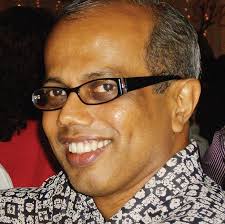Not just GST: A broader look at workers’ concerns
The Workers’ Day rally in Kuala Lumpur on May 1, attended by some 20,000 people, revealed the depth of the dissatisfaction felt among a signficant segment of workers and other ordinary Malaysians.
May 07, 2015

By Anil Netto
The Workers’ Day rally in Kuala Lumpur on May 1, attended by some 20,000 people, revealed the depth of the dissatisfaction felt among a signficant segment of workers and other ordinary Malaysians.
All kinds of groups were present on the day. Supporters of public parties, civil society groups, Orang Asli activists campaigning for land rights, student groups, groups representing farmers .. they were there to make their voices heard.
“Bantah GST!” they chanted as they marched to KLCC.
But the celebratory mood disappeared soon after the rally ended. In the days that followed, almost 40 people were called in to give statements, or were detained, or arrested. Many of them, including Ambiga Sreenivasan and a few MPs, were arrested and detained overnight before being released.
Despite the absence of many Pas supporters at the Workers’ Day rally, the thousands that showed up suggest that there is an undercurrent of discontentment in our society today.
What were those marching unhappy about?
According to the May 1 Declaration, endorsed by over 120 civil society groups and read out at Pasar Seni, it was not just about GST or 1MDB’s debts.
Let’s run through the concerns raised in the Declaration, which you won’t find published in the corporate-owned media:
--End negotiations for the Trans-Pacific Partnership Agreement. The concern here is that large multinational corporations will dominate the economy and further tilt the balance against workers.
--Introduce a RM1,500 minimum wage plus Cost of Living Allowance. We can probably agree it would be almost impossible to survive in the city on the present minimum of RM900. Food and transport costs alone will swallow that up.
--End all forms of discrimination. We do not even have 30 per cent women in Parliament.
--Protect migrant workers’ rights. Migrants are estimated to make up almost 20 per cent of the population here; yet, they have few rights and are, hence, easily exploited.
--Stop the privatisation of basic services. This has resulted in soaring tariffs, e.g. electicity bills at a time when many are literally feeling the heat.
--Free the media. The broadening of the Sedition Act has had a chilling effect on press freedom and our right to freedom of information.
--Control the prices of goods and services. We all know how the prices of essential items, especially food, have shot up.
--Uphold the rights of university students. How are we to find solutions to the problems that ail us when university students are not encouraged to look beyond their text books at larger socio-economic issues?
--Recognise Native Customary Rights Land. Many indigenous people have been displaced by plantations and mega projects.
--Protect the environment from incinerators, nuclear plants, and polluting industries. After extensive logging in the country, the worry now is, will we have nuclear power plants?
--Stop the eviction of estate workers, indigenous peoples, and urban settlers and provide them with homes that they can afford.
Again, we know how property prices have rocketed beyond the reach of many lower and middle-income Malaysians.
--Abolish draconian laws such as the Prevention of Terrorism Act, which allows detention without trial, and the Sedition Act.
--Protect the rights of people with disabilities. Make it easier for them to find work.
--Implement social security guarantees for all e.g. set up a pension scheme so that everyone is covered, and introduce a retrenchment fund so that workers who are laid off will not be stranded.
So, Workers’ Day is not just about wages and bonuses. It is about human dignity and promoting the common good.
This is in line with Catholic Social Teaching. A couple of months ago, the Bishop of Rome spoke out strongly against the abuse of workers.
Speaking in Naples, Italy, Francis related how he had met a woman who works 11 hours a day. For her efforts, the woman made just 600 euros a month, which meant she would have no money for pension or healthcare.
“This is called slavery,” Francis was reported as saying. “This is called exploitation! This is not human. This is not Christian.” Even in Malaysia, it is not uncommon to find workers, e.g. cleaners who are paid just RM700 per month without any benefits i.e. below the official minimum wage of RM900, which itself is an unrealistic figure.
Many workers, especially migrant workers, have to work long hours, 12 hours a day.
Francis posed a searching question when speaking up for them. “Are immigrants humans of second class?” … “We are all children of God, loved children, wanted.”
But there is a larger systemic problem as Francis, who has first-hand experience of the slums of Argentina, noted in Evangelii Gaudium. “While the earnings of a minority are growing exponentially, so too is the gap separating the majority from the prosperity enjoyed by those happy few. This imbalance is the result of ideologies which defend the absolute autonomy of the marketplace and financial speculation.”
One of the ideologies of the marketplace — the “trickle-down” theory — assumes that free market economic growth will eventually spill over and bring about greater social justice and inclusiveness.
But Francis dismissed this belief: “This opinion expresses a crude and naive trust in the goodness of those wielding economic power and in the sacralised workings of the prevailing economic system.”
Instead, the theory leads to major disappointment. “The promise was that when the glass was full, it would overflow, benefiting the poor. But what happens, instead, is that when the glass is full, it magically gets bigger and nothing ever comes out for the poor.”







Total Comments:0